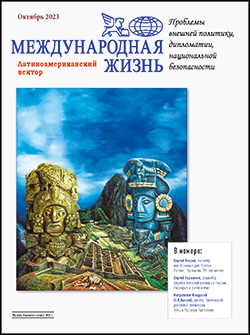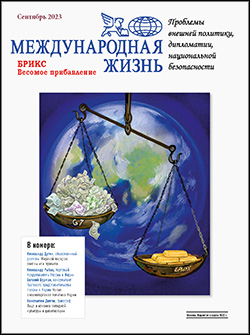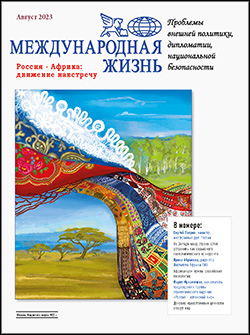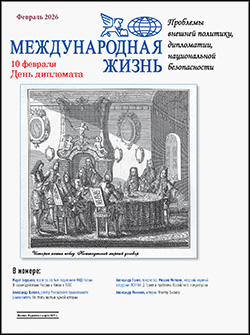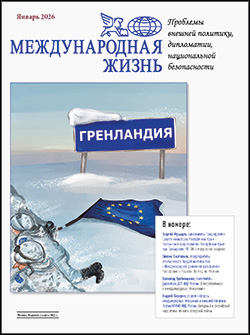Politics
Russia and Europe - can there be a breakthrough in the relationship?
I. Ivanov
On May 10, 2005 at the Russia - EU summit in Moscow a "road map" was approved for the creation of four areas of common ground. Optimistic scenarios were made of how the visa system will be cancelled, how there will be the harmonization of legislation between the parties, and what institutional form the "strategic partnership between the European Union and Russia" may become. Today, the number of optimists in Moscow and Brussels is greatly diminished. In Moscow the louder voices are of those who believe that the center of global economic activity is moving from the Atlantic to the Pacific, that Europe is not ready for globalization, and therefore is doomed to a growing gap behind Asia.
World Affairs Council: international experience and the Russian project
I. Timofeev
The creation of the Russian Council on International Affairs (RCIA) and the holding of the first meeting of its members in July 2011 raised a host of questions. What are the specifics of the new organization? What are the similarities to, and differences from their foreign counterparts? What does it do? How can I participate in its work? We will try to answer these questions, focusing on the feedback of our colleagues: diplomats, staff of relevant agencies, scientists, businessmen and representatives of non-governmental organizations.
Take a look back to see the future. On NATO's Strategic Concept
Janis Alex Zepos
NATO`s problems are different from those of other organizations, as it is faced with the new relationships that have evolved beyond the transatlantic area, organizations that are struggling to understand the new confusing and alarming global agenda and to develop measures to improve security. In contrast, the concern for NATO is the adaptation of the block, but not its survival. Thus, the question has been raised about what important role NATO can and should play in security in the next decade, and to create a wider international identity, aimed at consolidating its ability to mobilize the resources needed to carry out jointly agreed objectives.
People's diplomacy of the Moscow City Duma
V. Platonov
The city council provides international communication in order to better address the problems of urban management, via the introduction of various advanced technologies. The structure of foreign delegations that come to us, usually are not only deputies, with representatives of all factions, but without exception, representatives of the executive authority. It is normal international practice. We represent people in power, and our objective in international activities primarily consists in the fact that the capital's residents feel comfortable in other states and, accordingly, the same is true for foreigners in Moscow.
Oil reserves exist and will definitely last another century.
Y. Shafranik
In recent decades, we have almost doubled oil exports; imagine how we managed to increase capacity. To do this, we have launched many projects, for example, we launched the BPS (Baltic Pipeline System). It's a massive work, and it's just a colossal success. We increased exports and production volumes by almost double. The price during that time has increased from $ 20 to about $110 per barrel, that is, by five times. We received this huge amount of money that the country had never had before: costs have caught up, and outpaced growth rates. As soon as the price is set for the next year and a half at a certain level, the costs immediately begin catching up with the price.
The world around us
New Humanism as an ideological basis of world culture
Farid Mukhametshin
The worldview palette is not only becoming more complicated, but also becoming more fragile and unstable. The crisis of modern civilization is provoking an avalanche in the spread of social evils, and globalizing extremism, the extreme manifestation of which is terrorism. Needless to say, that as some are valued and some under-appreciated by the international community, the threats and challenges of the XXI century can and must be recognized and fended off within the framework of international cooperation. Indeed, the "bridging" of the desire for concerted collective action is, without exaggeration, the premise and the imperative for our continued existence.
Tough times for European social democracy: the Spanish example
A. Orlov
There is a certain point of view that the last century was the "golden age" of social democracy. Of course, this thesis has not only ardent supporters, but no less active counterparts. It is difficult not to agree with the fact that the very social-democratic ideology, and its "material carriers" - the socialist and social democratic parties - have strongly taken to the forefront in the creation of the ideological political system of the modern world. Throughout its history, full of bitter class wars and hot parliamentary battles, the social democratic idea has experienced profound evolutionary transformation.
Europe - an identity crisis or a "split personality"
P. Iskenderov
2011 was one of the most controversial years in modern European history. Despite the many apocalyptic predictions, the European Union managed to avoid immediate failure, and the fluctuations of the single European currency did not acquire destructive amplitude. However, the main difficulties for the Europeans are to come, and they are not seasonal or speculative, but are without any exaggeration, systemic in nature. The questionable results of the December EU summit marked the transition of the organization to a new state, in which control is "manual" and not automatic. The creation of the European Financial Stability Facility, the launch of the new agreement on the principles of EU action in the field of fiscal policy and the proliferating split in the EU's members on economic, foreign policy and other issues demonstrated the inefficiencies introduced in the 1990s, in the mechanisms of European integration.
Chief Editors Column
If tomorrow war comes...
A. Organison
A law that allows the U.S. president to severely limit the export of Iranian oil has caused a flurry of comments and a sharp reaction from Iran. Then the anti-Iran rhetoric subsided and conciliatory notes were heard from both sides. This, of course, does not change the facts and does not remove the main question from the global agenda: is the U.S. going to go to war with Iran and if so, when? In politics, predictions of this kind are not guesswork, because every war requires preparation. The mosaic of actions taken by Washington has gradually formed a curious picture. Almost simultaneously with the law on new sanctions against Iran, we heard before the New Year another statement, this time from the lips of the Vice President of the United States Joseph Biden. It turns out that the Taliban are no longer enemies of the United States.
Bookshelf
Civil society and the salvation of the state
E. Pyadysheva
In the nearly six thousand years of the existence of the State we have become familiar with a cycle of tragic histories, "a change of rulers - devastation of war and the sacrifices of the people - spontaneous riots and revolution - a new change of rulers - new promises - new devastation and casualties" and again a repetition of the same. It is estimated that over the past two centuries, only 20% of countries which are members of the UN managed to partially break this tragic cycle and reduce the causes of the riots and revolutions. Also in 20% of attempts to build a new relationship between government and the people. Book of S.Ya.Kuritsa and V.P.Vorobeva "citizen and the state - a tragic cycle of histories" on how to find ways and means to power the aspirations of government and the people.
***
International scientific conference "Russia - Ukraine - Belarus: Ways of Integration"
Magazine "International Affairs" in support of the MFA of Russia held on 17-21 October 2011 in Yalta, an International scientific conference, which brought together Russian, Ukrainian and Belarusian scientists and experts in the field of politics, history, economics, and political science. The main topic of discussion was the direction and path of integration of the three fraternal countries in a contemporary international environment.
Читайте другие материалы журнала «Международная жизнь» на нашем канале Яндекс.Дзен.
Подписывайтесь на наш Telegram – канал: https://t.me/interaffairs

 12:56 05.01.2012 •
12:56 05.01.2012 • 